Why you can trust TechRadar
Features and fitness
- Connects with the Fitbit app using a secure family account system
- Tracks steps and active minutes, as well as sleeping patterns
Setting up your Fitbit Ace is initially rather confusing. First, you'll need to have a standard Fitbit account, which won't be an issue with existing users, but might pose a stumbling block for those parents who haven't purchased a tracker for themselves yet.
Using the standard Fitbit app, you can set up a family account which allows you to add the Fitbit Ace and assign it to your child. Once you've done this, you can either choose to pair the device with your phone or allow your child to pair it with their own smart device. Given that my son doesn't have his own phone yet (I'm a cruel parent, obviously) I chose the former.

While the Ace does a good job of setting goals – 10,000 steps a day is the default, for example – you can use the app to keep tabs on how your child is doing but also set things like alarms to wake them in the morning. The app also keeps track of all of the badges they've earned, and will send you an email alert when they pass a particular goal. The setup is excellent for parents who want to make sure their child is exercising and remaining relatively active.
However, it's vital to remember that kids can easily become obsessed with this kind of data, with undesirable results. Thankfully, a child account cannot add other friends like a standard Fitbit account, so you don't have to worry about them being approached by strangers outside of your control.
Instead, everyone in your family can take part in challenges with other members, which is potentially a safer way of handling the competitive aspect of this device. Of course, that also means you'll all have to go out and purchase a Fitbit, but maybe that's all part of the company's devious plan?
The little animations which play when your child has reached a daily goal are a surprisingly effective means of getting them engaged with their fitness; the band also vibrates to give additional feedback when a notification comes in.
Active time – basically anything that is more strenuous than walking – is recorded automatically, and it's pretty accurate, for the most part.
Sleep tracking is also part of the package, and can be used to check on your offspring's slumber patterns each night.
However, if you're planning on using the system as a way of making sure they're not staying up late reading or playing video games, forget it – all they have to do is take off the band and the Fitbit app assumes they're fast asleep. There's no heart rate monitor on the Ace so it can't be used to make sure they're not cheating. Bah.
Battery life
- Battery life is rated for around 5 days per charge
- Ace uses proprietary charging cable, so don't lose it
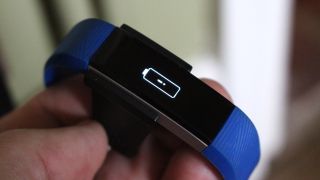
Fitbit quote 'up to five days' of battery life from a single charge, and that's a pretty reasonable estimation. Helpfully, you'll get alerts both on the app and via email when the battery level is running low, which is handy as kids aren't the most conscientious when it comes to making sure their devices are topped-up before leaving the house in the morning.
The bundled charging cable clips onto the back of the watch and charges over a USB connection, so you can use either your computer's USB port or the USB wall charger you get with pretty much very smartphone or tablet on the market these days. It's a proprietary charging cable so make sure your child doesn't lose it.
Verdict
Fitbit deserve some credit for creating a fitness tracker aimed at kids which isn't an embarrassment to be seen wearing; in fact, the upgradeable straps make this a solid choice for youngsters who want a tracker that they can grow up with.
The only stumbling block is that the Ace offers a slightly limited degree of functionality when compared to the 'real' Fitbit range, so they'll out-grow it eventually.
Still, if you're looking for a wearable for your kids which looks sleek and you already have several Fitbit users in your household, this is the ideal way to get your offspring serious about keeping active.
Who’s this for?
The term 'My First Fitbit' is very apt here; the Ace is aimed at kids who have never used a fitness tracker before and want some very basic incentive to get on their feet and burn some energy.
The device is marketed as being for kids aged 8 and up, but the changeable strap means even teenagers will be able to get some use out of it before upgrading to the real deal.
Should you buy it?
If you're concerned that your child isn't active enough then the Fitbit Ace is a good way of 'gamifying' exercise; however, at £80 it's quite pricey so you'll want to be sure they're not going to just take it off and forget about it.
If you're already tied into the Fitbit ecosystem yourself then the ability to control and monitor their performance via the standard Fitbit app is a boon too.
Competition
Don't think the Fitbit Ace suits your needs? Here are some alternatives you may want to consider instead.
Xiaomi Mi Band 3
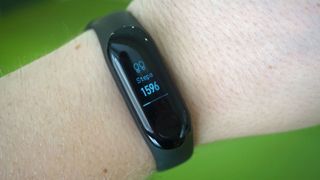
While this Chinese fitness tracker isn't officially available in the UK as yet, it's a solid challenger to the Fitbit Ace purely because it costs less than half the price – around £22, to be exact. This isn't specifically designed for children though, it's just a normal tracker.
- Read our Xiaomi Mi Band 3 review
Moov Now
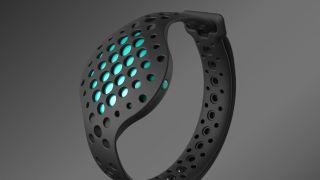
It may be incredibly basic and lack key features – including any kind of screen – but this is a cheap and accurate tracker which is ideal for fitness newcomers, as it's robust and can take plenty of knocks and bumps. Again, this is just a normal tracker for adults though.
- Read our Moov Now review
Garmin Vivofit 4
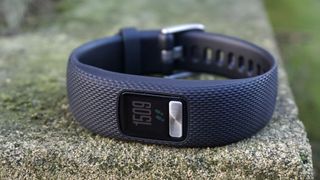
While it's not aimed at children, the Vivofit 4 is cheaper than the Fitbit Ace and offers the same kind of feature set.
- Read our Garmin Vivofit 4 review
Huawei Band 2 Pro
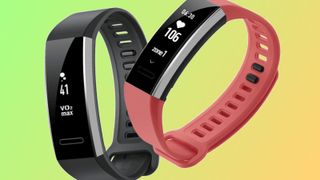
This is one of the best fitness trackers money can buy, and it's often around a third of the price of a Fitbit Ace. It has a lot more features than you'd need for a fitness tracker for children, but at half the price or below it's worth looking at as an alternative.
- Read our Huawei Band 2 Pro review

Amazon Prime Video's disappearing act could point to a future without the service

Tesla Cybertruck suffers new recall for a very scary problem

'The party is over for developers looking for AI freebies' — Google terminates Gemini API free access within months amidst rumors that it could charge for AI search queries
